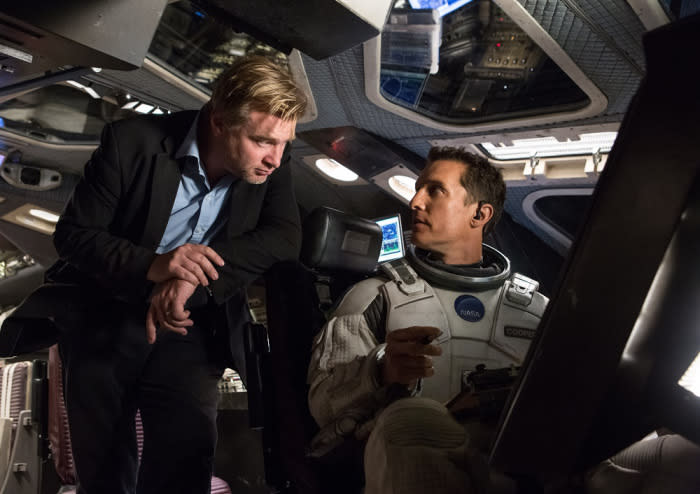Christopher Nolan Mum On New Project At London Film Festival Talk

Christopher Nolan took the BFI London Film Festival stage this afternoon to continue his crusade for the preservation of film as digital continues to dominate production, archive and exhibition. But he stayed silent on details of his next movie. That silence has been deafening since Warner Bros announced a release date: July 21, 2017. The studio has world rights on the new one, as it has had with all of Nolan’s recent pictures except for Interstellar, which it shared with Paramount.
During the panel today Interstellar came up quite a bit, and Nolan praised Quentin Tarantino, who plans to install 70mm projectors in some 50 screens in anticipation of the arrival of The Hateful Eight in Demember. Nolan also evangelized the dynamic range, peak whites and sense of time that he claimed only film could deliver.
Joining artist Tacita Dean, who works with film, and Alexander Horwath, the director of the Austrian Film Institute, who has insisted only on showing works in their original form, Nolan expressed frustration with studio executives demanding to know why he prefers to shoot film. “I have conversations where they say, ‘But doesn’t storytelling trump everything?’ Well, no, because otherwise we’d all be doing radio plays,” he said. “The medium is very much a part of the concept.”

He equated the digital revolution with the trend to colorize black-and-white films in the 1980s. “Periods of technological advancement confuse [ideas about medium],” Nolan insisted. “Digital technology has allowed access to the history of cinema, which is phenomenal, but people aren’t aware that any transfer you do is a translation of the original material. There’s always a difference.”
This was a film love-in through and through, with Dean saying, “Never has a medium been under such threat.” The artist later praised the democratization of filmmaking through devices like the iPhone, but warned, “Everyone has a pencil, but not everyone can draw.”
The benefits of digital were discussed only inasmuch as the conveniences didn’t matter. Nolan said he loved the “resistance of the medium” – the challenges and effort it took to deliver good-looking shots. “With Interstellar, the choice of camera angles was predicated on where we could cram the Imax camera,” Nolan noted. “It was shot how you’d have had to shoot it if you were [on the spaceship], so it added credibility.”
Nolan also discussed the myth that digital captured more detail, arguing a photochemical process would always be superior to a resolution-limited image. Asked about High Frame Rate, the tech trialed to little success on The Hobbit, Nolan noted it had first been tried on film. “And we even had a discussion about shooting Inception in 48fps in 70mm. We found that while you’d solve some of the artifacts of motion blur, you also get other artifacts, because you don’t get the same motion blur that your eye sees.” The 24fps, he said simply, was the sweet spot that mimicked the human eye. “Film is all about imagining what the eye could see.”

The director contradicted the received wisdom that he’d insisted on Interstellar’s exclusive 70mm projection window. “It was Paramount’s idea to project Interstellar on 70mm, and a year before that they were the first company to announce they wouldn’t be striking any more film prints. If it can be shown to add value to a release, they’re always prepared to do it.”
In the end, it came down to finances. With particular disregard for the arguments about the lower cost of digital exhibition, Nolan quipped, “We’re still paying the same for the cinema as we ever were, so where are these marvellous savings?”
Questions from the audience suggested Nolan and the panel were preaching to the choir, with questions focussed around a love of film, and its increasing scarcity. Horwath summarized the event, and the need to continue the fight, by saying that when he first started flat-out refusing to program the DCP transfers of films, distributors suddenly “found” a 35mm or 70mm print. “You just have to keep asking the question.”
But one question remained elusive and unanswered: How much do wider, multiplex audiences truly care whether they are, as Nolan put it, paying for the privilege of “sitting in an empty room, watching TV”?
Related‘Suffragette’ London Film Festival Premiere Delayed By Protesters
Related stories
Warner Bros Secures Christopher Nolan's Next Movie For Summer 2017
Christopher Nolan Headlines LFF Connects; Fortissimo Weds 'La Novia' - Global Briefs
Christopher Nolan Joins Film Foundation Board
Get more from Deadline.com: Follow us on Twitter, Facebook, Newsletter


